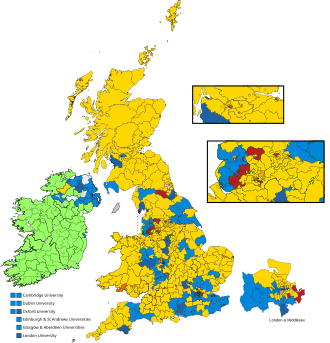
Back যুক্তরাজ্যের সাধারণ নির্বাচন, ১৯০৬ Bengali/Bangla Etholiad cyffredinol y Deyrnas Unedig yng Nghymru, 1906 Welsh Britische Unterhauswahl 1906 German Elecciones generales del Reino Unido de 1906 Spanish Élections générales britanniques de 1906 French הבחירות הכלליות בבריטניה 1906 HE Pemilihan umum Britania Raya 1906 ID Elezioni generali nel Regno Unito del 1906 Italian 1906年イギリス総選挙 Japanese 1906년 영국 총선 Korean
| |||||||||||||||||||||||||||||||||||||||||||||||||||||||||||||||||||||||||||||
All 670 seats in the House of Commons 336 seats needed for a majority | |||||||||||||||||||||||||||||||||||||||||||||||||||||||||||||||||||||||||||||
|---|---|---|---|---|---|---|---|---|---|---|---|---|---|---|---|---|---|---|---|---|---|---|---|---|---|---|---|---|---|---|---|---|---|---|---|---|---|---|---|---|---|---|---|---|---|---|---|---|---|---|---|---|---|---|---|---|---|---|---|---|---|---|---|---|---|---|---|---|---|---|---|---|---|---|---|---|---|
| Turnout | 5,246,672 83.2% ( | ||||||||||||||||||||||||||||||||||||||||||||||||||||||||||||||||||||||||||||
| |||||||||||||||||||||||||||||||||||||||||||||||||||||||||||||||||||||||||||||
 Colours denote the winning party | |||||||||||||||||||||||||||||||||||||||||||||||||||||||||||||||||||||||||||||
 Composition of the House of Commons after the election | |||||||||||||||||||||||||||||||||||||||||||||||||||||||||||||||||||||||||||||
| |||||||||||||||||||||||||||||||||||||||||||||||||||||||||||||||||||||||||||||
The 1906 United Kingdom general election was held from 12 January to 8 February 1906. It is dubbed as the "Liberal landslide": the opposition Liberals under Henry Campbell-Bannerman won a landslide victory against a bewildered Conservative Party, in which its leader, Arthur Balfour lost his seat; the party won the fewest amount of seats it ever had in its history, a feat unsurpassed until 2024. This particular landslide is now ranked alongside the 1924, 1931, 1945, 1983, 1997, 2001, and 2024 general elections as one of the largest landslide election victories.[1][2]
The Labour Representation Committee was far more successful than at the 1900 general election and after the election would be renamed the Labour Party with 29 MPs and Keir Hardie as leader. The Irish Parliamentary Party, led by John Redmond, achieved its seats with a relatively low number of votes, as 73 candidates stood unopposed. This election was a landslide defeat for the Conservative Party and their Liberal Unionist allies, with the primary reason given by historians being the party's weakness after its split over the issue of free trade (Joseph Chamberlain had resigned from government in September 1903 in order to campaign for Tariff Reform, which would allow "preferential tariffs"). Many working-class people at the time saw this as a threat to the price of food, hence the debate was nicknamed "Big Loaf, Little Loaf". The Liberals' landslide victory of 125 seats over all other parties led to the passing of social legislation known as the Liberal reforms.
This was the last general election in which the Liberals won an absolute majority in the House of Commons, the last general election in which neither Labour nor the Conservatives won the popular vote, and the only election held between 1886 and 1945 in which the Conservatives did not win the popular vote. It was also the last peacetime election held more than five years after the previous one prior to passage of the Parliament Act 1911, which limited the duration of Parliaments in peacetime to five years. In this election the Conservatives were reduced to their lowest seat count in the party's history, a record not broken until 2024, 118 years later.
- ^ BBC NEWS – Programmes – BBC Parliament – 1906: The Liberal landslide, 9 February 2006
- ^ "UK general election results live: Rishi Sunak to resign as Conservative Party leader after crushing election defeat". BBC News. Retrieved 5 July 2024.
© MMXXIII Rich X Search. We shall prevail. All rights reserved. Rich X Search



